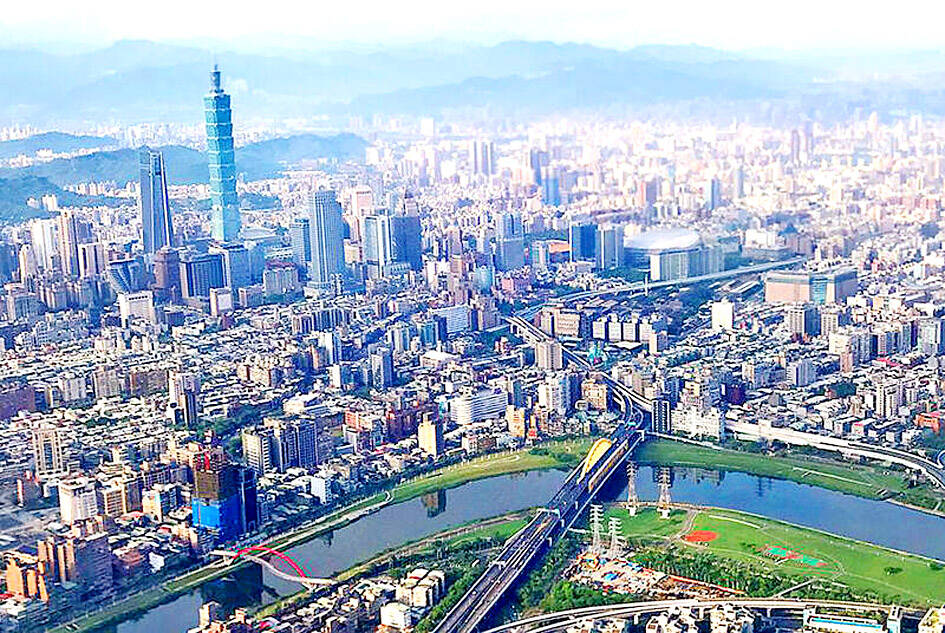Taiwan was 25th on last year’s Corruption Perceptions Index, its best ranking in 25 years, the Agency Against Corruption said in a statement yesterday.
Taiwan scored 67, the same as in 2023, but up three places from 28th among the 180 countries and regions evaluated by the index, which is published by Transparency International.
Taiwan was seventh among the 31 countries and regions in the Asia-Pacific region, behind Singapore (84), New Zealand (83), Australia (77), Hong Kong (74), Bhutan (72) and Japan (71), the agency said.

Photo: Tyrone Siu, Reuters
Taiwan’s score was higher than 86 percent of the countries and regions evaluated, the agency added.
The highest-ranked country was Denmark with a score of 90, followed by Finland (88), Singapore (84) and New Zealand (83), the report showed.
Luxembourg, Norway and Switzerland tied for fifth with scores of 81, it showed.
The global average was 43, it showed.
Transparency International’s office in Taiwan said that although Taiwan’s score was the same as in 2023, it rose in the rankings because Austria, France and the US dropped points.
However, Taiwan’s score in 2022 was 68, indicating that the fight for government integrity cannot rest on its laurels, the office said.
Taiwan was classified as a “complete democracy,” as well as having an “open” civil space, in which people can freely express their opinions and journalists can report without threat, it said.
However, the average score for complete democracies was 73, while countries with open civil spaces had an average score of 70, both of which Taiwan failed to achieve, posing a warning signal for the country, it said.
The index is compiled from a combination of at least three data sources from 13 corruption surveys and assessments, which are collected by reputable institutions, including the World Bank and the World Economic Forum, Transparency International’s Web site says.
Transparency International was established in 1993 and works globally to “stop corruption and promote transparency, accountability and integrity at all levels and across all sectors of society,” it says.

Taiwanese can file complaints with the Tourism Administration to report travel agencies if their activities caused termination of a person’s citizenship, Mainland Affairs Council Minister Chiu Chui-cheng (邱垂正) said yesterday, after a podcaster highlighted a case in which a person’s citizenship was canceled for receiving a single-use Chinese passport to enter Russia. The council is aware of incidents in which people who signed up through Chinese travel agencies for tours of Russia were told they could obtain Russian visas and fast-track border clearance, Chiu told reporters on the sidelines of an event in Taipei. However, the travel agencies actually applied

New measures aimed at making Taiwan more attractive to foreign professionals came into effect this month, the National Development Council said yesterday. Among the changes, international students at Taiwanese universities would be able to work in Taiwan without a work permit in the two years after they graduate, explainer materials provided by the council said. In addition, foreign nationals who graduated from one of the world’s top 200 universities within the past five years can also apply for a two-year open work permit. Previously, those graduates would have needed to apply for a work permit using point-based criteria or have a Taiwanese company

The Shilin District Prosecutors’ Office yesterday indicted two Taiwanese and issued a wanted notice for Pete Liu (劉作虎), founder of Shenzhen-based smartphone manufacturer OnePlus Technology Co (萬普拉斯科技), for allegedly contravening the Act Governing Relations Between the People of the Taiwan Area and the Mainland Area (臺灣地區與大陸地區人民關係條例) by poaching 70 engineers in Taiwan. Liu allegedly traveled to Taiwan at the end of 2014 and met with a Taiwanese man surnamed Lin (林) to discuss establishing a mobile software research and development (R&D) team in Taiwan, prosecutors said. Without approval from the government, Lin, following Liu’s instructions, recruited more than 70 software

Taiwanese singer Jay Chou (周杰倫) plans to take to the courts of the Australian Open for the first time as a competitor in the high-stakes 1 Point Slam. The Australian Open yesterday afternoon announced the news on its official Instagram account, welcoming Chou — who celebrates his 47th birthday on Sunday — to the star-studded lineup of the tournament’s signature warm-up event. “From being the King of Mandarin Pop filling stadiums with his music to being Kato from The Green Hornet and now shifting focus to being a dedicated tennis player — welcome @jaychou to the 1 Point Slam and #AusOpen,” the